Business Law Assignment: Corporations Act and Shareholder Rights
VerifiedAdded on 2021/05/31
|20
|5255
|59
Homework Assignment
AI Summary
This Business Law assignment analyzes several key aspects of company law under the Australian Corporations Act 2001. The assignment addresses issues such as employment contracts, loans, and investments within a company, examining the separate legal entity principle established in Salomon v A Salomon and Co Ltd and the rights of employees and shareholders. It also explores the formation of proprietary companies, the importance of company constitutions, and the amendment of replaceable rules, particularly focusing on the powers of directors and shareholders. Furthermore, the assignment delves into the definition of a director, considering the influence of individuals on company decisions, and examines the issuance of different share classes (common and preference shares) and associated voting rights, along with the necessary shareholder approvals. The solution provides a comprehensive analysis of each scenario, referencing relevant case law and statutory provisions to support its conclusions.
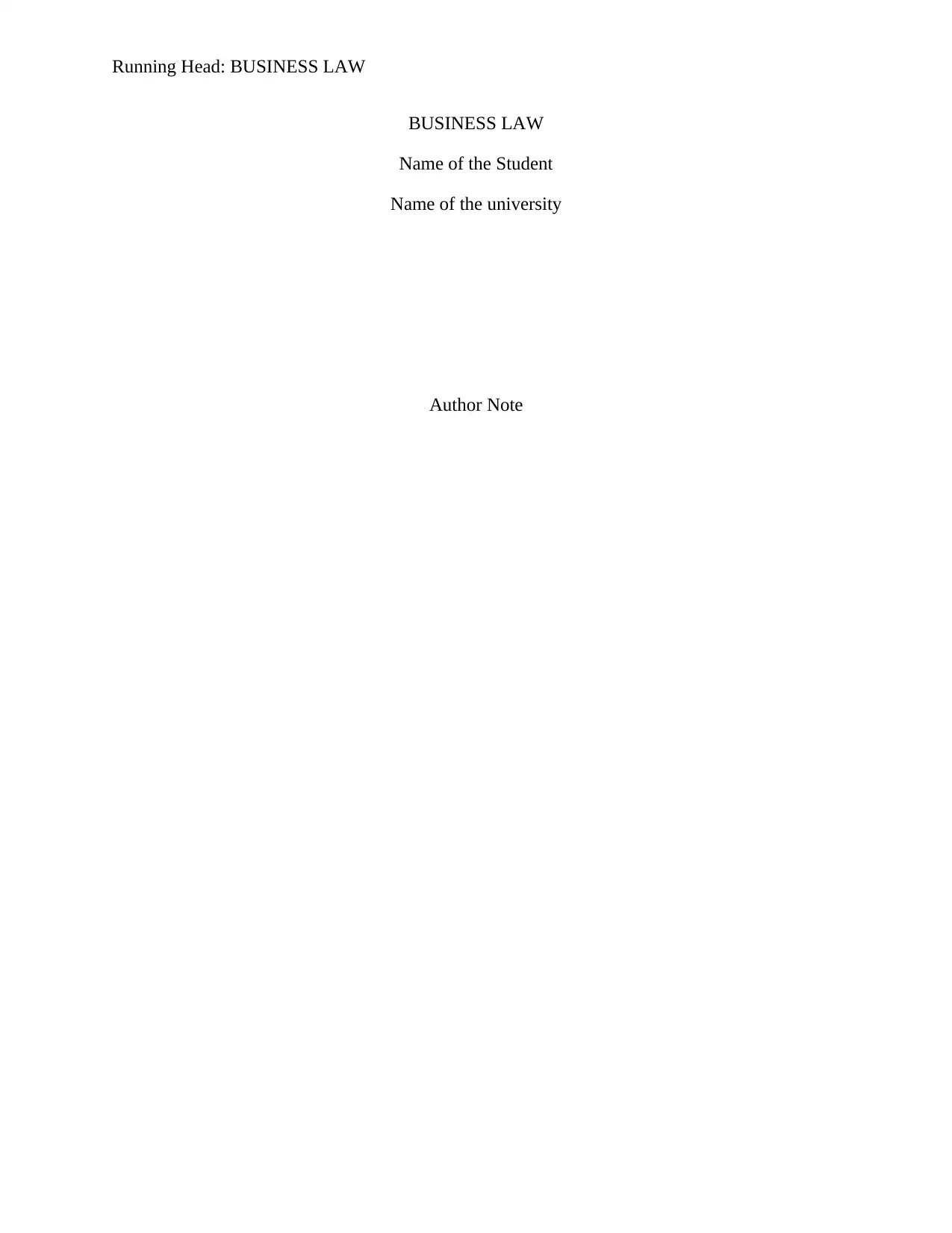
Running Head: BUSINESS LAW
BUSINESS LAW
Name of the Student
Name of the university
Author Note
BUSINESS LAW
Name of the Student
Name of the university
Author Note
Paraphrase This Document
Need a fresh take? Get an instant paraphrase of this document with our AI Paraphraser
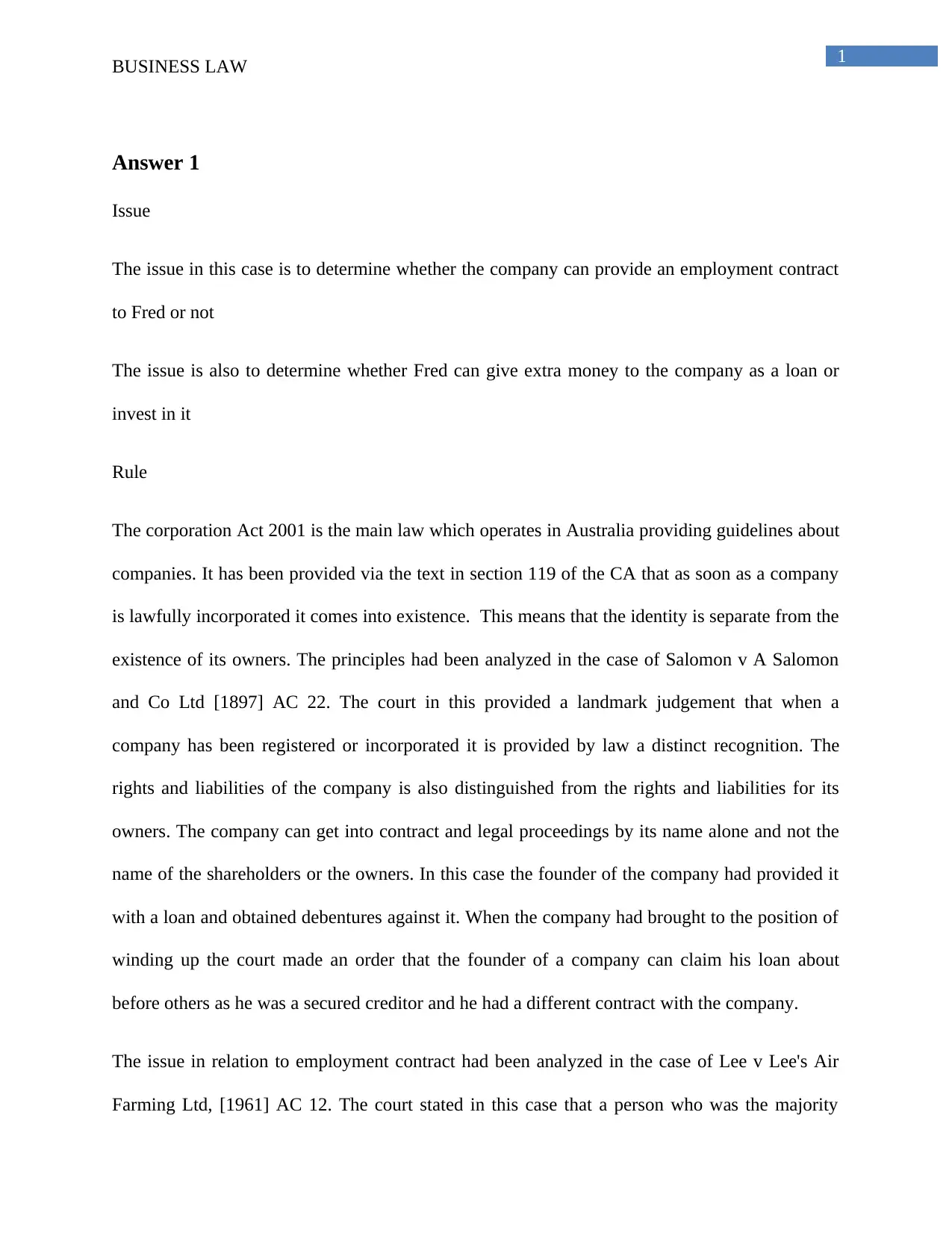
1
BUSINESS LAW
Answer 1
Issue
The issue in this case is to determine whether the company can provide an employment contract
to Fred or not
The issue is also to determine whether Fred can give extra money to the company as a loan or
invest in it
Rule
The corporation Act 2001 is the main law which operates in Australia providing guidelines about
companies. It has been provided via the text in section 119 of the CA that as soon as a company
is lawfully incorporated it comes into existence. This means that the identity is separate from the
existence of its owners. The principles had been analyzed in the case of Salomon v A Salomon
and Co Ltd [1897] AC 22. The court in this provided a landmark judgement that when a
company has been registered or incorporated it is provided by law a distinct recognition. The
rights and liabilities of the company is also distinguished from the rights and liabilities for its
owners. The company can get into contract and legal proceedings by its name alone and not the
name of the shareholders or the owners. In this case the founder of the company had provided it
with a loan and obtained debentures against it. When the company had brought to the position of
winding up the court made an order that the founder of a company can claim his loan about
before others as he was a secured creditor and he had a different contract with the company.
The issue in relation to employment contract had been analyzed in the case of Lee v Lee's Air
Farming Ltd, [1961] AC 12. The court stated in this case that a person who was the majority
BUSINESS LAW
Answer 1
Issue
The issue in this case is to determine whether the company can provide an employment contract
to Fred or not
The issue is also to determine whether Fred can give extra money to the company as a loan or
invest in it
Rule
The corporation Act 2001 is the main law which operates in Australia providing guidelines about
companies. It has been provided via the text in section 119 of the CA that as soon as a company
is lawfully incorporated it comes into existence. This means that the identity is separate from the
existence of its owners. The principles had been analyzed in the case of Salomon v A Salomon
and Co Ltd [1897] AC 22. The court in this provided a landmark judgement that when a
company has been registered or incorporated it is provided by law a distinct recognition. The
rights and liabilities of the company is also distinguished from the rights and liabilities for its
owners. The company can get into contract and legal proceedings by its name alone and not the
name of the shareholders or the owners. In this case the founder of the company had provided it
with a loan and obtained debentures against it. When the company had brought to the position of
winding up the court made an order that the founder of a company can claim his loan about
before others as he was a secured creditor and he had a different contract with the company.
The issue in relation to employment contract had been analyzed in the case of Lee v Lee's Air
Farming Ltd, [1961] AC 12. The court stated in this case that a person who was the majority
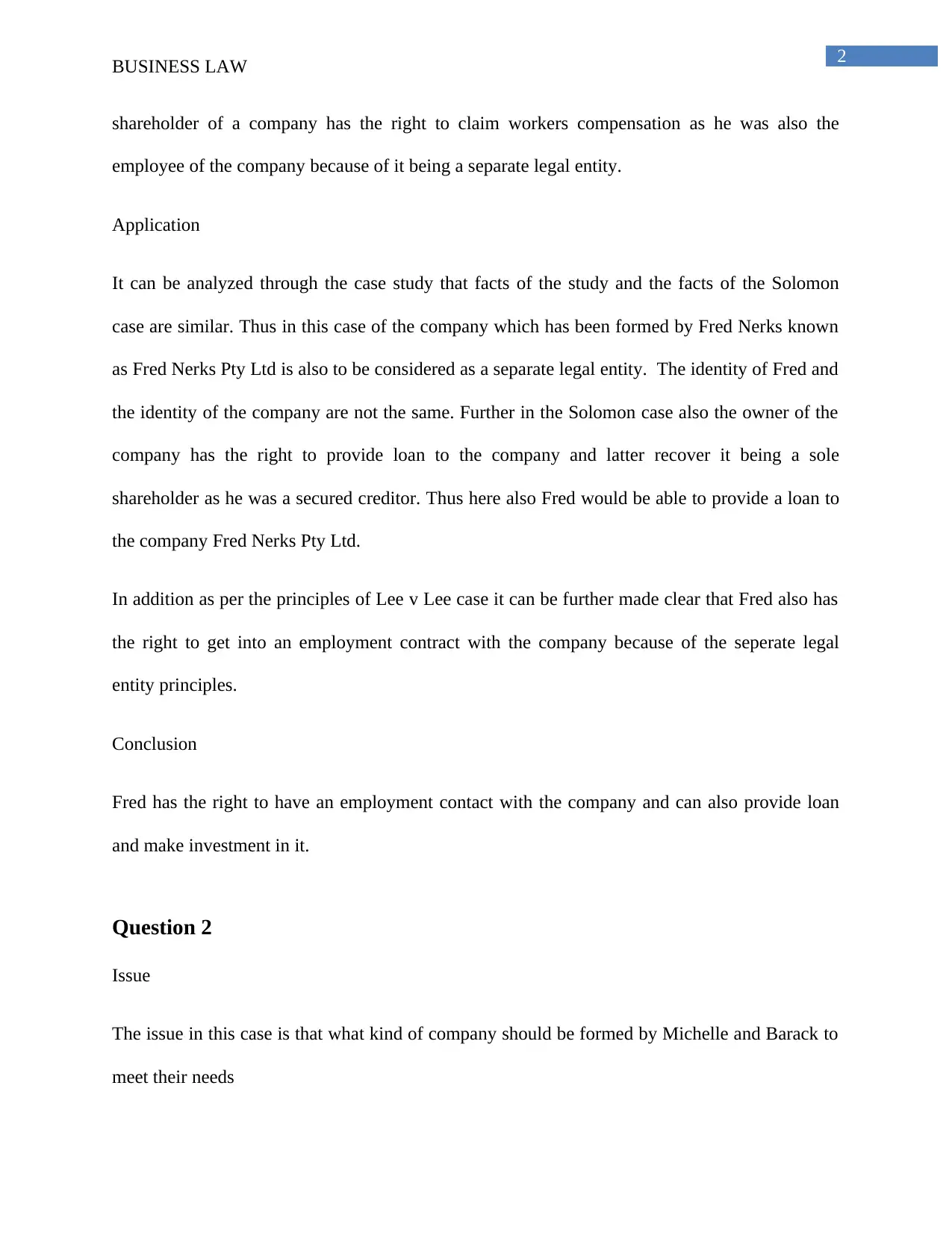
2
BUSINESS LAW
shareholder of a company has the right to claim workers compensation as he was also the
employee of the company because of it being a separate legal entity.
Application
It can be analyzed through the case study that facts of the study and the facts of the Solomon
case are similar. Thus in this case of the company which has been formed by Fred Nerks known
as Fred Nerks Pty Ltd is also to be considered as a separate legal entity. The identity of Fred and
the identity of the company are not the same. Further in the Solomon case also the owner of the
company has the right to provide loan to the company and latter recover it being a sole
shareholder as he was a secured creditor. Thus here also Fred would be able to provide a loan to
the company Fred Nerks Pty Ltd.
In addition as per the principles of Lee v Lee case it can be further made clear that Fred also has
the right to get into an employment contract with the company because of the seperate legal
entity principles.
Conclusion
Fred has the right to have an employment contact with the company and can also provide loan
and make investment in it.
Question 2
Issue
The issue in this case is that what kind of company should be formed by Michelle and Barack to
meet their needs
BUSINESS LAW
shareholder of a company has the right to claim workers compensation as he was also the
employee of the company because of it being a separate legal entity.
Application
It can be analyzed through the case study that facts of the study and the facts of the Solomon
case are similar. Thus in this case of the company which has been formed by Fred Nerks known
as Fred Nerks Pty Ltd is also to be considered as a separate legal entity. The identity of Fred and
the identity of the company are not the same. Further in the Solomon case also the owner of the
company has the right to provide loan to the company and latter recover it being a sole
shareholder as he was a secured creditor. Thus here also Fred would be able to provide a loan to
the company Fred Nerks Pty Ltd.
In addition as per the principles of Lee v Lee case it can be further made clear that Fred also has
the right to get into an employment contract with the company because of the seperate legal
entity principles.
Conclusion
Fred has the right to have an employment contact with the company and can also provide loan
and make investment in it.
Question 2
Issue
The issue in this case is that what kind of company should be formed by Michelle and Barack to
meet their needs
⊘ This is a preview!⊘
Do you want full access?
Subscribe today to unlock all pages.

Trusted by 1+ million students worldwide
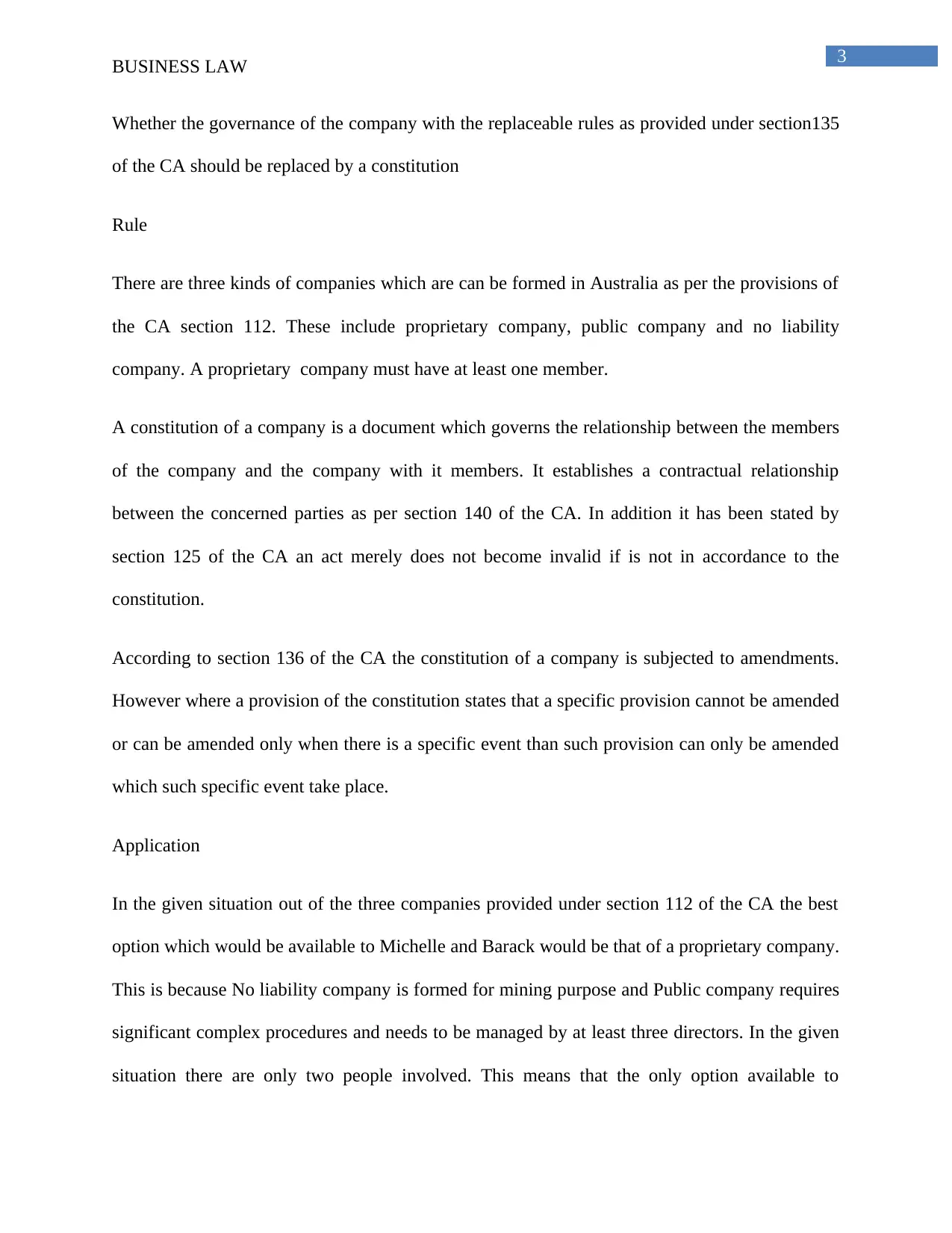
3
BUSINESS LAW
Whether the governance of the company with the replaceable rules as provided under section135
of the CA should be replaced by a constitution
Rule
There are three kinds of companies which are can be formed in Australia as per the provisions of
the CA section 112. These include proprietary company, public company and no liability
company. A proprietary company must have at least one member.
A constitution of a company is a document which governs the relationship between the members
of the company and the company with it members. It establishes a contractual relationship
between the concerned parties as per section 140 of the CA. In addition it has been stated by
section 125 of the CA an act merely does not become invalid if is not in accordance to the
constitution.
According to section 136 of the CA the constitution of a company is subjected to amendments.
However where a provision of the constitution states that a specific provision cannot be amended
or can be amended only when there is a specific event than such provision can only be amended
which such specific event take place.
Application
In the given situation out of the three companies provided under section 112 of the CA the best
option which would be available to Michelle and Barack would be that of a proprietary company.
This is because No liability company is formed for mining purpose and Public company requires
significant complex procedures and needs to be managed by at least three directors. In the given
situation there are only two people involved. This means that the only option available to
BUSINESS LAW
Whether the governance of the company with the replaceable rules as provided under section135
of the CA should be replaced by a constitution
Rule
There are three kinds of companies which are can be formed in Australia as per the provisions of
the CA section 112. These include proprietary company, public company and no liability
company. A proprietary company must have at least one member.
A constitution of a company is a document which governs the relationship between the members
of the company and the company with it members. It establishes a contractual relationship
between the concerned parties as per section 140 of the CA. In addition it has been stated by
section 125 of the CA an act merely does not become invalid if is not in accordance to the
constitution.
According to section 136 of the CA the constitution of a company is subjected to amendments.
However where a provision of the constitution states that a specific provision cannot be amended
or can be amended only when there is a specific event than such provision can only be amended
which such specific event take place.
Application
In the given situation out of the three companies provided under section 112 of the CA the best
option which would be available to Michelle and Barack would be that of a proprietary company.
This is because No liability company is formed for mining purpose and Public company requires
significant complex procedures and needs to be managed by at least three directors. In the given
situation there are only two people involved. This means that the only option available to
Paraphrase This Document
Need a fresh take? Get an instant paraphrase of this document with our AI Paraphraser
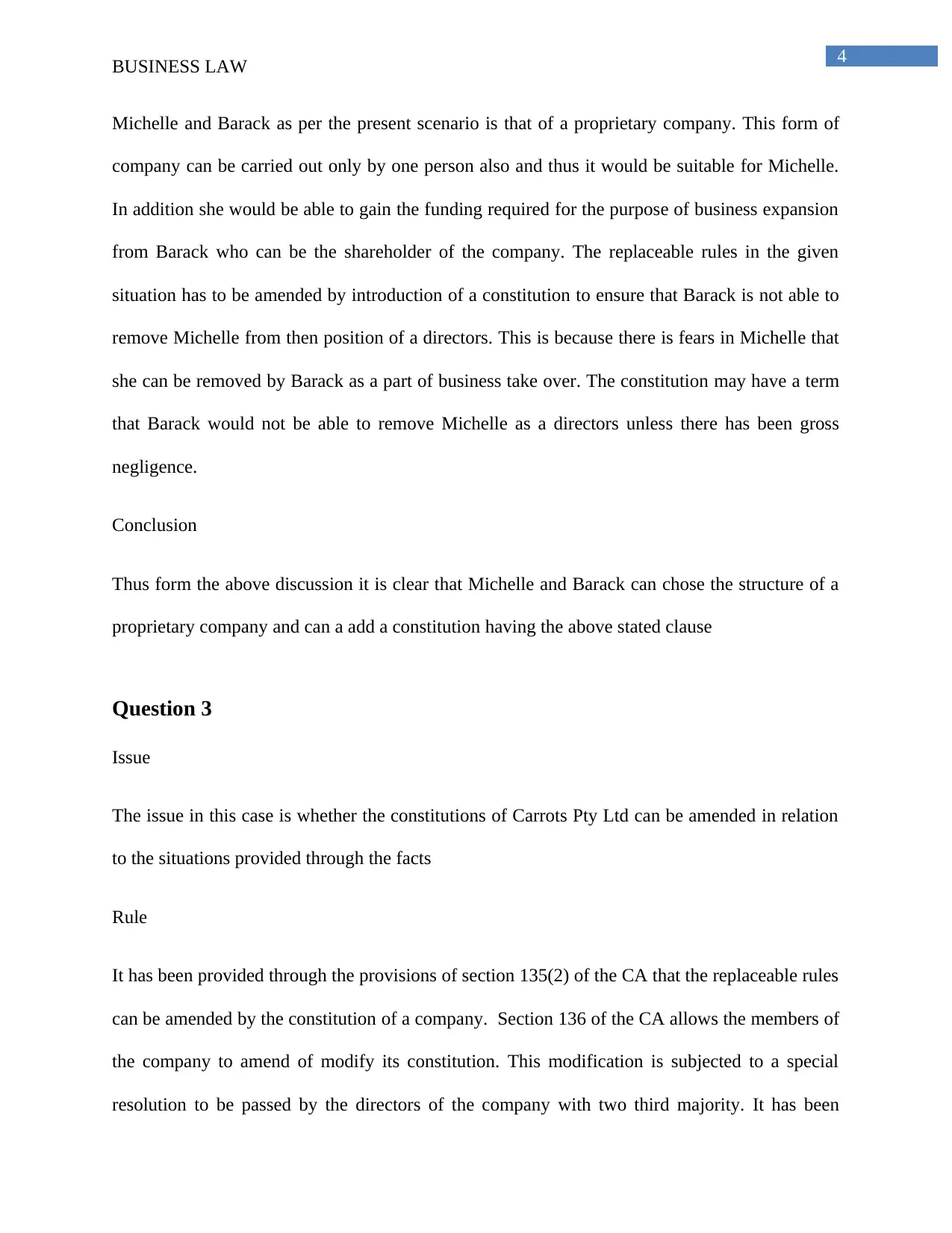
4
BUSINESS LAW
Michelle and Barack as per the present scenario is that of a proprietary company. This form of
company can be carried out only by one person also and thus it would be suitable for Michelle.
In addition she would be able to gain the funding required for the purpose of business expansion
from Barack who can be the shareholder of the company. The replaceable rules in the given
situation has to be amended by introduction of a constitution to ensure that Barack is not able to
remove Michelle from then position of a directors. This is because there is fears in Michelle that
she can be removed by Barack as a part of business take over. The constitution may have a term
that Barack would not be able to remove Michelle as a directors unless there has been gross
negligence.
Conclusion
Thus form the above discussion it is clear that Michelle and Barack can chose the structure of a
proprietary company and can a add a constitution having the above stated clause
Question 3
Issue
The issue in this case is whether the constitutions of Carrots Pty Ltd can be amended in relation
to the situations provided through the facts
Rule
It has been provided through the provisions of section 135(2) of the CA that the replaceable rules
can be amended by the constitution of a company. Section 136 of the CA allows the members of
the company to amend of modify its constitution. This modification is subjected to a special
resolution to be passed by the directors of the company with two third majority. It has been
BUSINESS LAW
Michelle and Barack as per the present scenario is that of a proprietary company. This form of
company can be carried out only by one person also and thus it would be suitable for Michelle.
In addition she would be able to gain the funding required for the purpose of business expansion
from Barack who can be the shareholder of the company. The replaceable rules in the given
situation has to be amended by introduction of a constitution to ensure that Barack is not able to
remove Michelle from then position of a directors. This is because there is fears in Michelle that
she can be removed by Barack as a part of business take over. The constitution may have a term
that Barack would not be able to remove Michelle as a directors unless there has been gross
negligence.
Conclusion
Thus form the above discussion it is clear that Michelle and Barack can chose the structure of a
proprietary company and can a add a constitution having the above stated clause
Question 3
Issue
The issue in this case is whether the constitutions of Carrots Pty Ltd can be amended in relation
to the situations provided through the facts
Rule
It has been provided through the provisions of section 135(2) of the CA that the replaceable rules
can be amended by the constitution of a company. Section 136 of the CA allows the members of
the company to amend of modify its constitution. This modification is subjected to a special
resolution to be passed by the directors of the company with two third majority. It has been
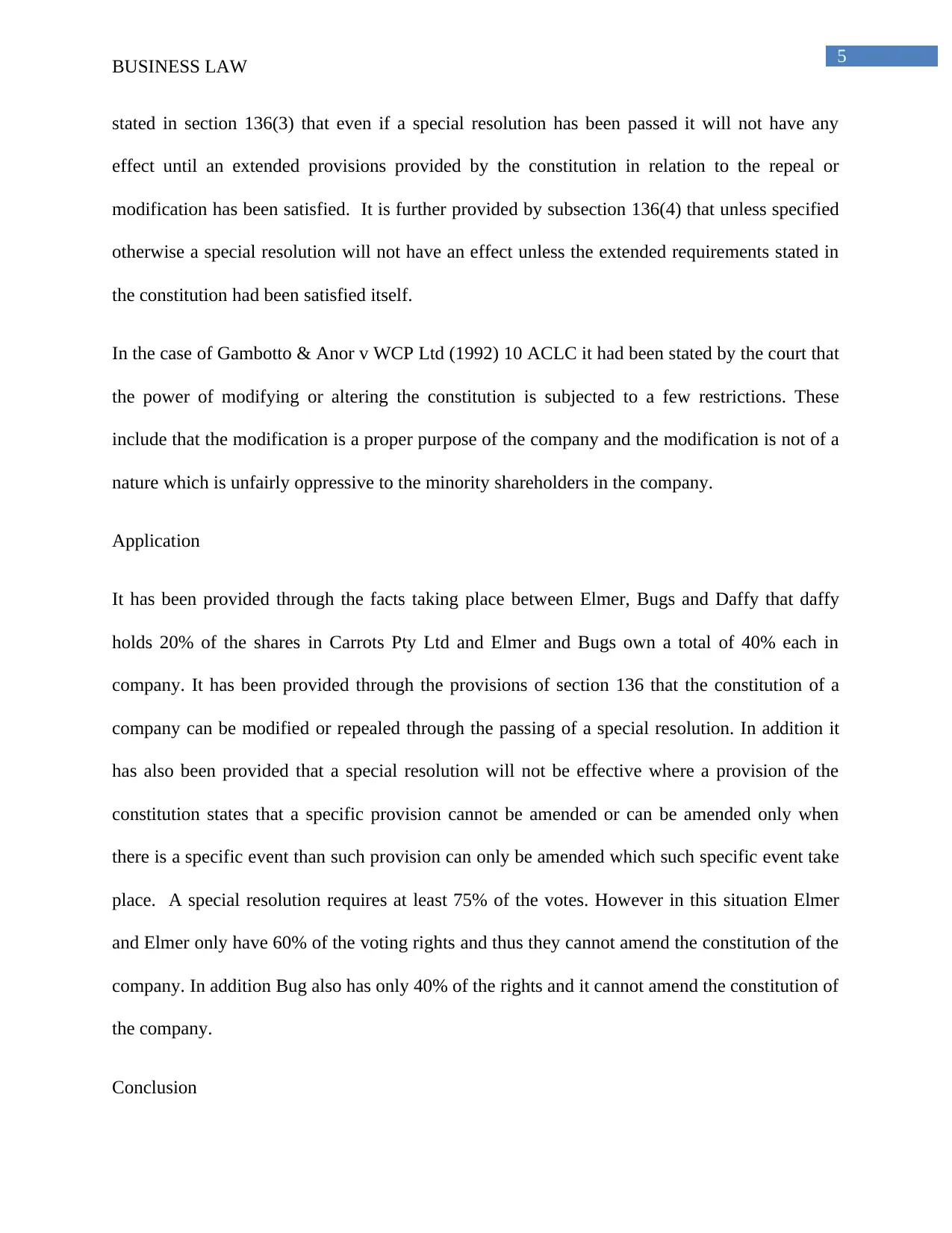
5
BUSINESS LAW
stated in section 136(3) that even if a special resolution has been passed it will not have any
effect until an extended provisions provided by the constitution in relation to the repeal or
modification has been satisfied. It is further provided by subsection 136(4) that unless specified
otherwise a special resolution will not have an effect unless the extended requirements stated in
the constitution had been satisfied itself.
In the case of Gambotto & Anor v WCP Ltd (1992) 10 ACLC it had been stated by the court that
the power of modifying or altering the constitution is subjected to a few restrictions. These
include that the modification is a proper purpose of the company and the modification is not of a
nature which is unfairly oppressive to the minority shareholders in the company.
Application
It has been provided through the facts taking place between Elmer, Bugs and Daffy that daffy
holds 20% of the shares in Carrots Pty Ltd and Elmer and Bugs own a total of 40% each in
company. It has been provided through the provisions of section 136 that the constitution of a
company can be modified or repealed through the passing of a special resolution. In addition it
has also been provided that a special resolution will not be effective where a provision of the
constitution states that a specific provision cannot be amended or can be amended only when
there is a specific event than such provision can only be amended which such specific event take
place. A special resolution requires at least 75% of the votes. However in this situation Elmer
and Elmer only have 60% of the voting rights and thus they cannot amend the constitution of the
company. In addition Bug also has only 40% of the rights and it cannot amend the constitution of
the company.
Conclusion
BUSINESS LAW
stated in section 136(3) that even if a special resolution has been passed it will not have any
effect until an extended provisions provided by the constitution in relation to the repeal or
modification has been satisfied. It is further provided by subsection 136(4) that unless specified
otherwise a special resolution will not have an effect unless the extended requirements stated in
the constitution had been satisfied itself.
In the case of Gambotto & Anor v WCP Ltd (1992) 10 ACLC it had been stated by the court that
the power of modifying or altering the constitution is subjected to a few restrictions. These
include that the modification is a proper purpose of the company and the modification is not of a
nature which is unfairly oppressive to the minority shareholders in the company.
Application
It has been provided through the facts taking place between Elmer, Bugs and Daffy that daffy
holds 20% of the shares in Carrots Pty Ltd and Elmer and Bugs own a total of 40% each in
company. It has been provided through the provisions of section 136 that the constitution of a
company can be modified or repealed through the passing of a special resolution. In addition it
has also been provided that a special resolution will not be effective where a provision of the
constitution states that a specific provision cannot be amended or can be amended only when
there is a specific event than such provision can only be amended which such specific event take
place. A special resolution requires at least 75% of the votes. However in this situation Elmer
and Elmer only have 60% of the voting rights and thus they cannot amend the constitution of the
company. In addition Bug also has only 40% of the rights and it cannot amend the constitution of
the company.
Conclusion
⊘ This is a preview!⊘
Do you want full access?
Subscribe today to unlock all pages.

Trusted by 1+ million students worldwide
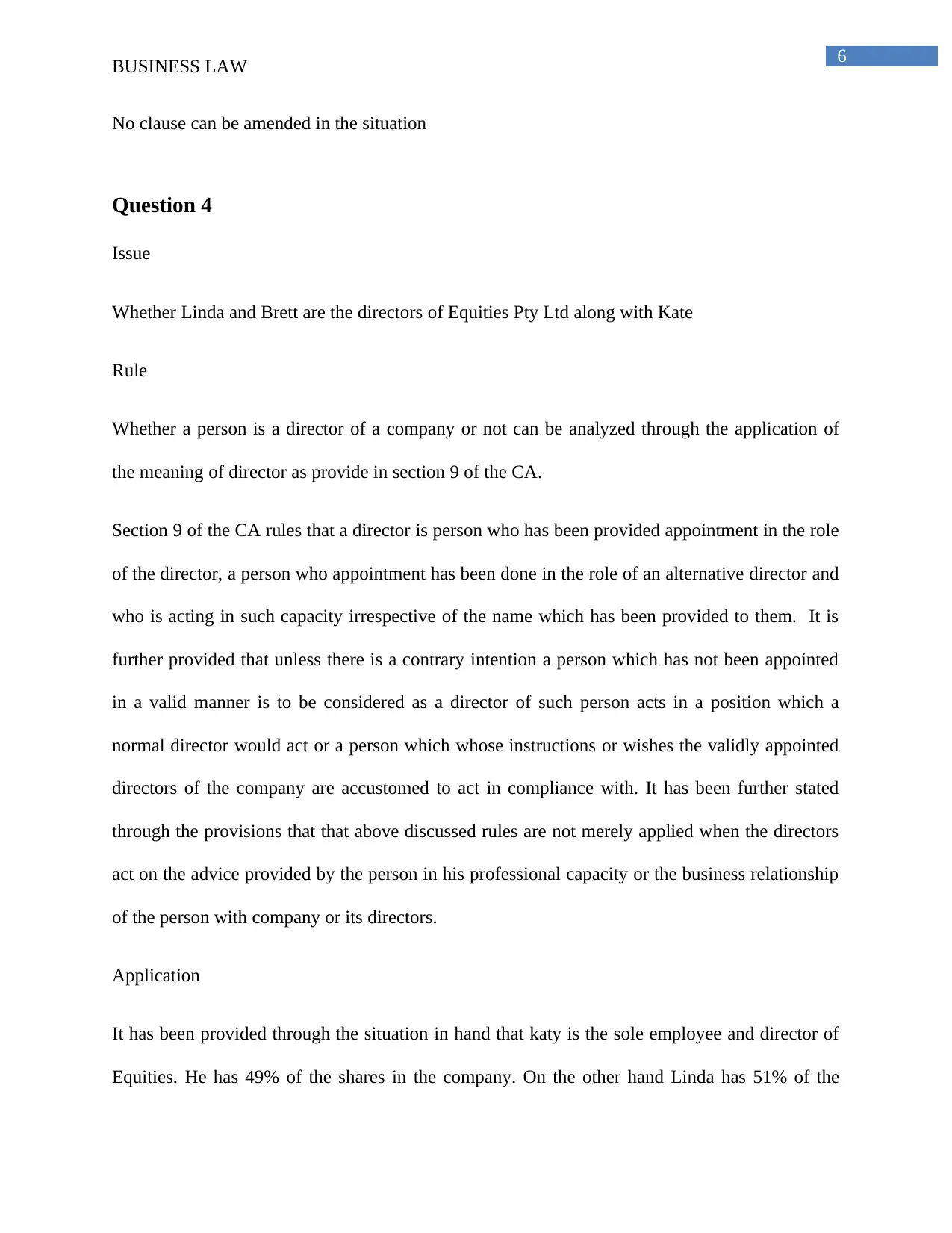
6
BUSINESS LAW
No clause can be amended in the situation
Question 4
Issue
Whether Linda and Brett are the directors of Equities Pty Ltd along with Kate
Rule
Whether a person is a director of a company or not can be analyzed through the application of
the meaning of director as provide in section 9 of the CA.
Section 9 of the CA rules that a director is person who has been provided appointment in the role
of the director, a person who appointment has been done in the role of an alternative director and
who is acting in such capacity irrespective of the name which has been provided to them. It is
further provided that unless there is a contrary intention a person which has not been appointed
in a valid manner is to be considered as a director of such person acts in a position which a
normal director would act or a person which whose instructions or wishes the validly appointed
directors of the company are accustomed to act in compliance with. It has been further stated
through the provisions that that above discussed rules are not merely applied when the directors
act on the advice provided by the person in his professional capacity or the business relationship
of the person with company or its directors.
Application
It has been provided through the situation in hand that katy is the sole employee and director of
Equities. He has 49% of the shares in the company. On the other hand Linda has 51% of the
BUSINESS LAW
No clause can be amended in the situation
Question 4
Issue
Whether Linda and Brett are the directors of Equities Pty Ltd along with Kate
Rule
Whether a person is a director of a company or not can be analyzed through the application of
the meaning of director as provide in section 9 of the CA.
Section 9 of the CA rules that a director is person who has been provided appointment in the role
of the director, a person who appointment has been done in the role of an alternative director and
who is acting in such capacity irrespective of the name which has been provided to them. It is
further provided that unless there is a contrary intention a person which has not been appointed
in a valid manner is to be considered as a director of such person acts in a position which a
normal director would act or a person which whose instructions or wishes the validly appointed
directors of the company are accustomed to act in compliance with. It has been further stated
through the provisions that that above discussed rules are not merely applied when the directors
act on the advice provided by the person in his professional capacity or the business relationship
of the person with company or its directors.
Application
It has been provided through the situation in hand that katy is the sole employee and director of
Equities. He has 49% of the shares in the company. On the other hand Linda has 51% of the
Paraphrase This Document
Need a fresh take? Get an instant paraphrase of this document with our AI Paraphraser
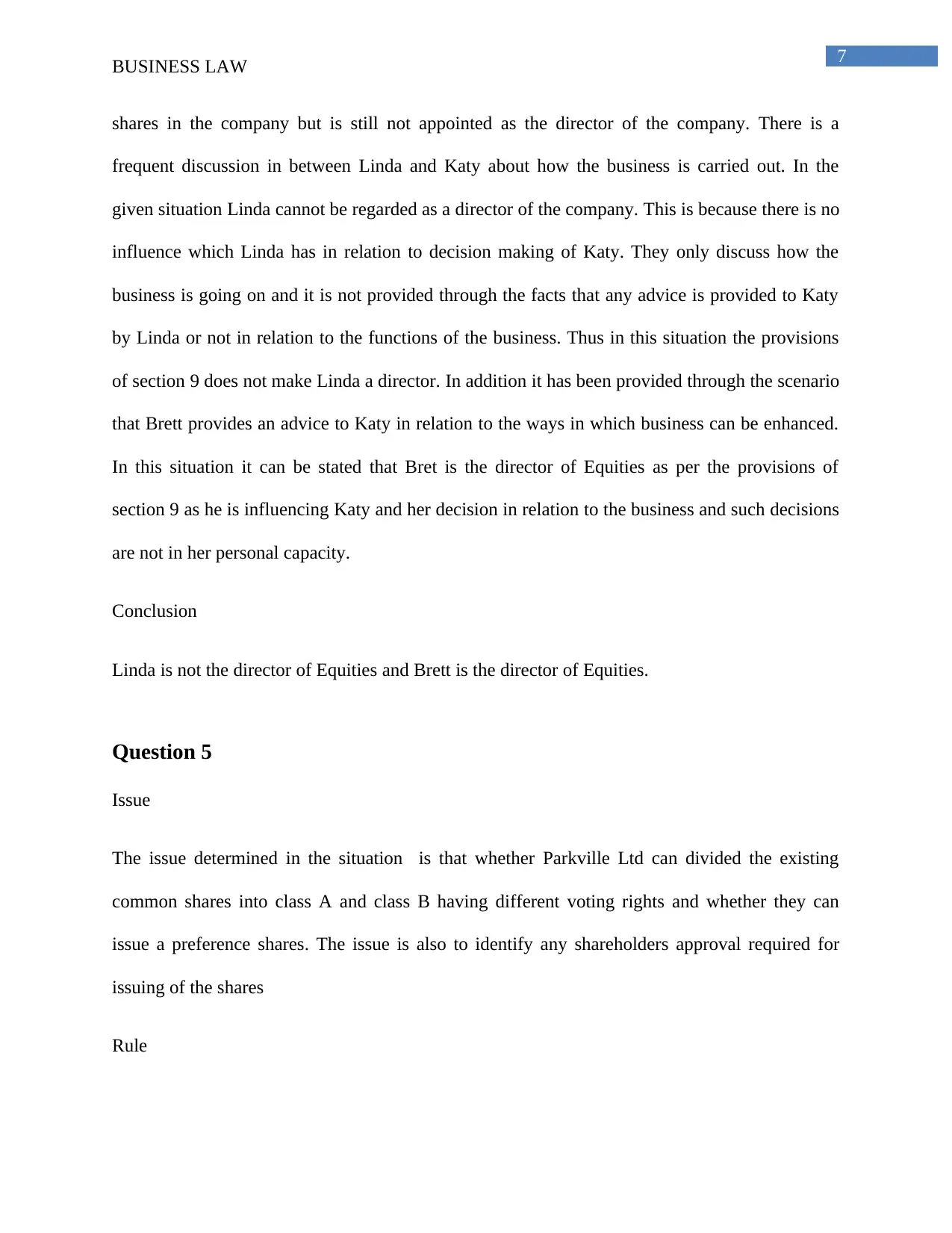
7
BUSINESS LAW
shares in the company but is still not appointed as the director of the company. There is a
frequent discussion in between Linda and Katy about how the business is carried out. In the
given situation Linda cannot be regarded as a director of the company. This is because there is no
influence which Linda has in relation to decision making of Katy. They only discuss how the
business is going on and it is not provided through the facts that any advice is provided to Katy
by Linda or not in relation to the functions of the business. Thus in this situation the provisions
of section 9 does not make Linda a director. In addition it has been provided through the scenario
that Brett provides an advice to Katy in relation to the ways in which business can be enhanced.
In this situation it can be stated that Bret is the director of Equities as per the provisions of
section 9 as he is influencing Katy and her decision in relation to the business and such decisions
are not in her personal capacity.
Conclusion
Linda is not the director of Equities and Brett is the director of Equities.
Question 5
Issue
The issue determined in the situation is that whether Parkville Ltd can divided the existing
common shares into class A and class B having different voting rights and whether they can
issue a preference shares. The issue is also to identify any shareholders approval required for
issuing of the shares
Rule
BUSINESS LAW
shares in the company but is still not appointed as the director of the company. There is a
frequent discussion in between Linda and Katy about how the business is carried out. In the
given situation Linda cannot be regarded as a director of the company. This is because there is no
influence which Linda has in relation to decision making of Katy. They only discuss how the
business is going on and it is not provided through the facts that any advice is provided to Katy
by Linda or not in relation to the functions of the business. Thus in this situation the provisions
of section 9 does not make Linda a director. In addition it has been provided through the scenario
that Brett provides an advice to Katy in relation to the ways in which business can be enhanced.
In this situation it can be stated that Bret is the director of Equities as per the provisions of
section 9 as he is influencing Katy and her decision in relation to the business and such decisions
are not in her personal capacity.
Conclusion
Linda is not the director of Equities and Brett is the director of Equities.
Question 5
Issue
The issue determined in the situation is that whether Parkville Ltd can divided the existing
common shares into class A and class B having different voting rights and whether they can
issue a preference shares. The issue is also to identify any shareholders approval required for
issuing of the shares
Rule
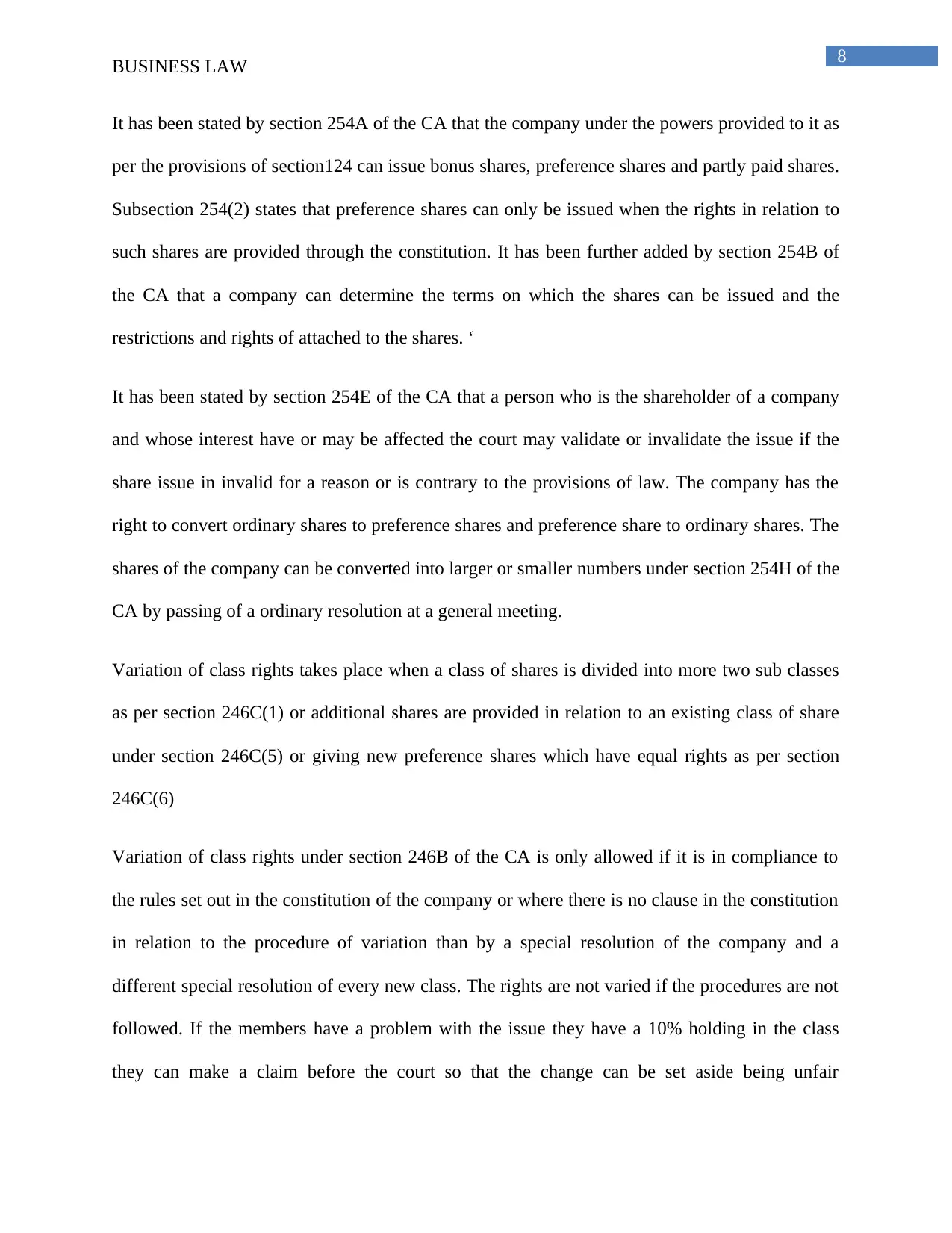
8
BUSINESS LAW
It has been stated by section 254A of the CA that the company under the powers provided to it as
per the provisions of section124 can issue bonus shares, preference shares and partly paid shares.
Subsection 254(2) states that preference shares can only be issued when the rights in relation to
such shares are provided through the constitution. It has been further added by section 254B of
the CA that a company can determine the terms on which the shares can be issued and the
restrictions and rights of attached to the shares. ‘
It has been stated by section 254E of the CA that a person who is the shareholder of a company
and whose interest have or may be affected the court may validate or invalidate the issue if the
share issue in invalid for a reason or is contrary to the provisions of law. The company has the
right to convert ordinary shares to preference shares and preference share to ordinary shares. The
shares of the company can be converted into larger or smaller numbers under section 254H of the
CA by passing of a ordinary resolution at a general meeting.
Variation of class rights takes place when a class of shares is divided into more two sub classes
as per section 246C(1) or additional shares are provided in relation to an existing class of share
under section 246C(5) or giving new preference shares which have equal rights as per section
246C(6)
Variation of class rights under section 246B of the CA is only allowed if it is in compliance to
the rules set out in the constitution of the company or where there is no clause in the constitution
in relation to the procedure of variation than by a special resolution of the company and a
different special resolution of every new class. The rights are not varied if the procedures are not
followed. If the members have a problem with the issue they have a 10% holding in the class
they can make a claim before the court so that the change can be set aside being unfair
BUSINESS LAW
It has been stated by section 254A of the CA that the company under the powers provided to it as
per the provisions of section124 can issue bonus shares, preference shares and partly paid shares.
Subsection 254(2) states that preference shares can only be issued when the rights in relation to
such shares are provided through the constitution. It has been further added by section 254B of
the CA that a company can determine the terms on which the shares can be issued and the
restrictions and rights of attached to the shares. ‘
It has been stated by section 254E of the CA that a person who is the shareholder of a company
and whose interest have or may be affected the court may validate or invalidate the issue if the
share issue in invalid for a reason or is contrary to the provisions of law. The company has the
right to convert ordinary shares to preference shares and preference share to ordinary shares. The
shares of the company can be converted into larger or smaller numbers under section 254H of the
CA by passing of a ordinary resolution at a general meeting.
Variation of class rights takes place when a class of shares is divided into more two sub classes
as per section 246C(1) or additional shares are provided in relation to an existing class of share
under section 246C(5) or giving new preference shares which have equal rights as per section
246C(6)
Variation of class rights under section 246B of the CA is only allowed if it is in compliance to
the rules set out in the constitution of the company or where there is no clause in the constitution
in relation to the procedure of variation than by a special resolution of the company and a
different special resolution of every new class. The rights are not varied if the procedures are not
followed. If the members have a problem with the issue they have a 10% holding in the class
they can make a claim before the court so that the change can be set aside being unfair
⊘ This is a preview!⊘
Do you want full access?
Subscribe today to unlock all pages.

Trusted by 1+ million students worldwide
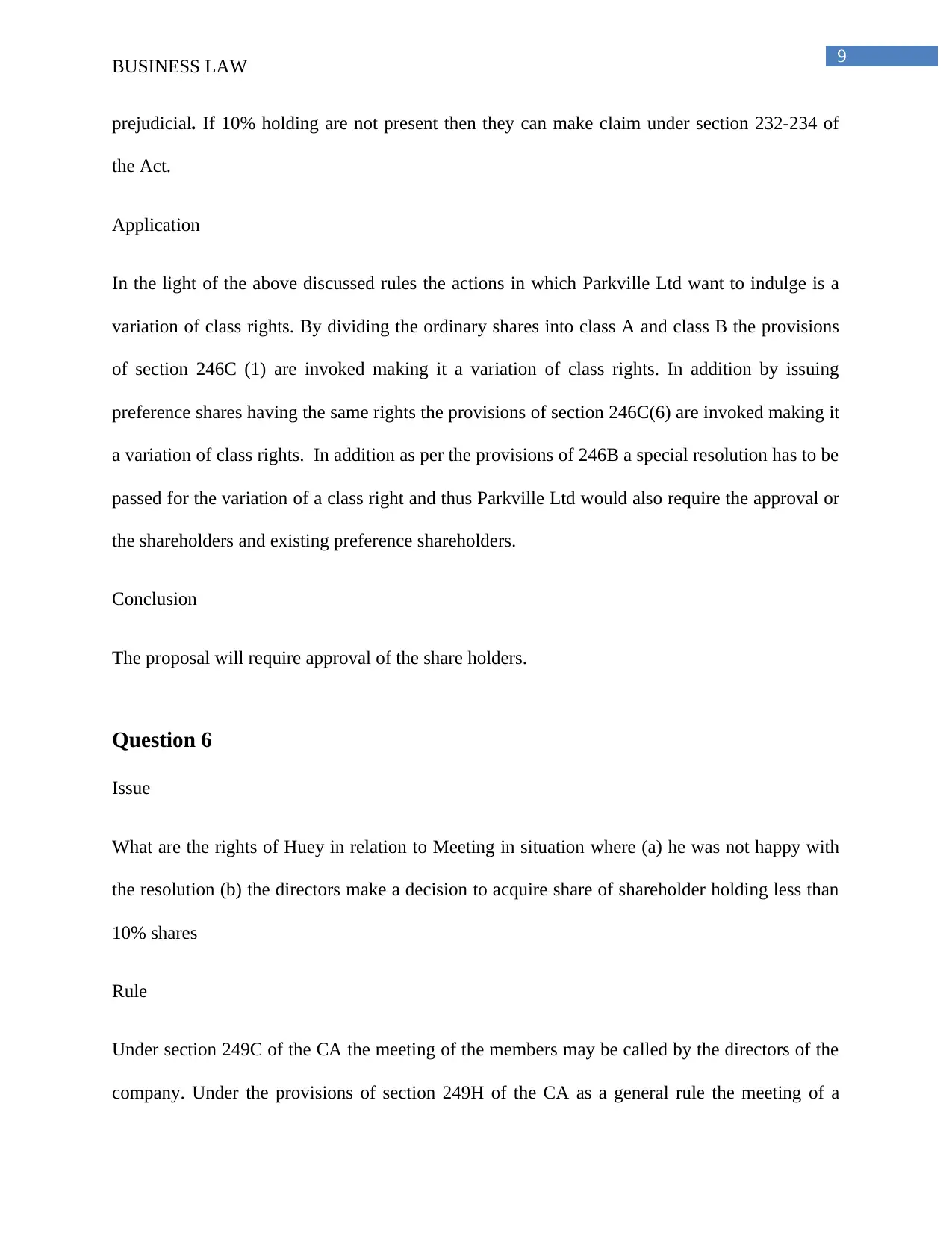
9
BUSINESS LAW
prejudicial. If 10% holding are not present then they can make claim under section 232-234 of
the Act.
Application
In the light of the above discussed rules the actions in which Parkville Ltd want to indulge is a
variation of class rights. By dividing the ordinary shares into class A and class B the provisions
of section 246C (1) are invoked making it a variation of class rights. In addition by issuing
preference shares having the same rights the provisions of section 246C(6) are invoked making it
a variation of class rights. In addition as per the provisions of 246B a special resolution has to be
passed for the variation of a class right and thus Parkville Ltd would also require the approval or
the shareholders and existing preference shareholders.
Conclusion
The proposal will require approval of the share holders.
Question 6
Issue
What are the rights of Huey in relation to Meeting in situation where (a) he was not happy with
the resolution (b) the directors make a decision to acquire share of shareholder holding less than
10% shares
Rule
Under section 249C of the CA the meeting of the members may be called by the directors of the
company. Under the provisions of section 249H of the CA as a general rule the meeting of a
BUSINESS LAW
prejudicial. If 10% holding are not present then they can make claim under section 232-234 of
the Act.
Application
In the light of the above discussed rules the actions in which Parkville Ltd want to indulge is a
variation of class rights. By dividing the ordinary shares into class A and class B the provisions
of section 246C (1) are invoked making it a variation of class rights. In addition by issuing
preference shares having the same rights the provisions of section 246C(6) are invoked making it
a variation of class rights. In addition as per the provisions of 246B a special resolution has to be
passed for the variation of a class right and thus Parkville Ltd would also require the approval or
the shareholders and existing preference shareholders.
Conclusion
The proposal will require approval of the share holders.
Question 6
Issue
What are the rights of Huey in relation to Meeting in situation where (a) he was not happy with
the resolution (b) the directors make a decision to acquire share of shareholder holding less than
10% shares
Rule
Under section 249C of the CA the meeting of the members may be called by the directors of the
company. Under the provisions of section 249H of the CA as a general rule the meeting of a
Paraphrase This Document
Need a fresh take? Get an instant paraphrase of this document with our AI Paraphraser
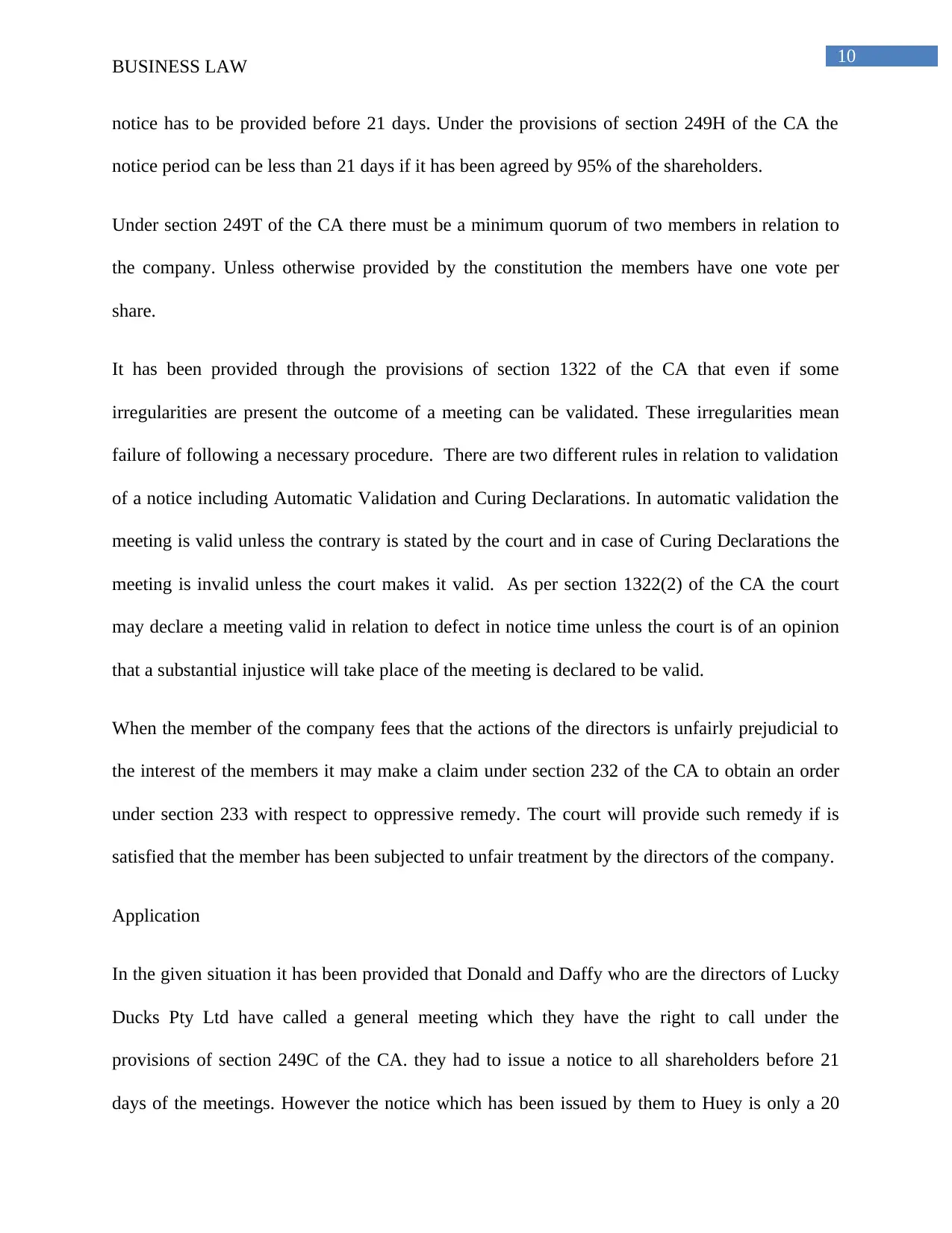
10
BUSINESS LAW
notice has to be provided before 21 days. Under the provisions of section 249H of the CA the
notice period can be less than 21 days if it has been agreed by 95% of the shareholders.
Under section 249T of the CA there must be a minimum quorum of two members in relation to
the company. Unless otherwise provided by the constitution the members have one vote per
share.
It has been provided through the provisions of section 1322 of the CA that even if some
irregularities are present the outcome of a meeting can be validated. These irregularities mean
failure of following a necessary procedure. There are two different rules in relation to validation
of a notice including Automatic Validation and Curing Declarations. In automatic validation the
meeting is valid unless the contrary is stated by the court and in case of Curing Declarations the
meeting is invalid unless the court makes it valid. As per section 1322(2) of the CA the court
may declare a meeting valid in relation to defect in notice time unless the court is of an opinion
that a substantial injustice will take place of the meeting is declared to be valid.
When the member of the company fees that the actions of the directors is unfairly prejudicial to
the interest of the members it may make a claim under section 232 of the CA to obtain an order
under section 233 with respect to oppressive remedy. The court will provide such remedy if is
satisfied that the member has been subjected to unfair treatment by the directors of the company.
Application
In the given situation it has been provided that Donald and Daffy who are the directors of Lucky
Ducks Pty Ltd have called a general meeting which they have the right to call under the
provisions of section 249C of the CA. they had to issue a notice to all shareholders before 21
days of the meetings. However the notice which has been issued by them to Huey is only a 20
BUSINESS LAW
notice has to be provided before 21 days. Under the provisions of section 249H of the CA the
notice period can be less than 21 days if it has been agreed by 95% of the shareholders.
Under section 249T of the CA there must be a minimum quorum of two members in relation to
the company. Unless otherwise provided by the constitution the members have one vote per
share.
It has been provided through the provisions of section 1322 of the CA that even if some
irregularities are present the outcome of a meeting can be validated. These irregularities mean
failure of following a necessary procedure. There are two different rules in relation to validation
of a notice including Automatic Validation and Curing Declarations. In automatic validation the
meeting is valid unless the contrary is stated by the court and in case of Curing Declarations the
meeting is invalid unless the court makes it valid. As per section 1322(2) of the CA the court
may declare a meeting valid in relation to defect in notice time unless the court is of an opinion
that a substantial injustice will take place of the meeting is declared to be valid.
When the member of the company fees that the actions of the directors is unfairly prejudicial to
the interest of the members it may make a claim under section 232 of the CA to obtain an order
under section 233 with respect to oppressive remedy. The court will provide such remedy if is
satisfied that the member has been subjected to unfair treatment by the directors of the company.
Application
In the given situation it has been provided that Donald and Daffy who are the directors of Lucky
Ducks Pty Ltd have called a general meeting which they have the right to call under the
provisions of section 249C of the CA. they had to issue a notice to all shareholders before 21
days of the meetings. However the notice which has been issued by them to Huey is only a 20
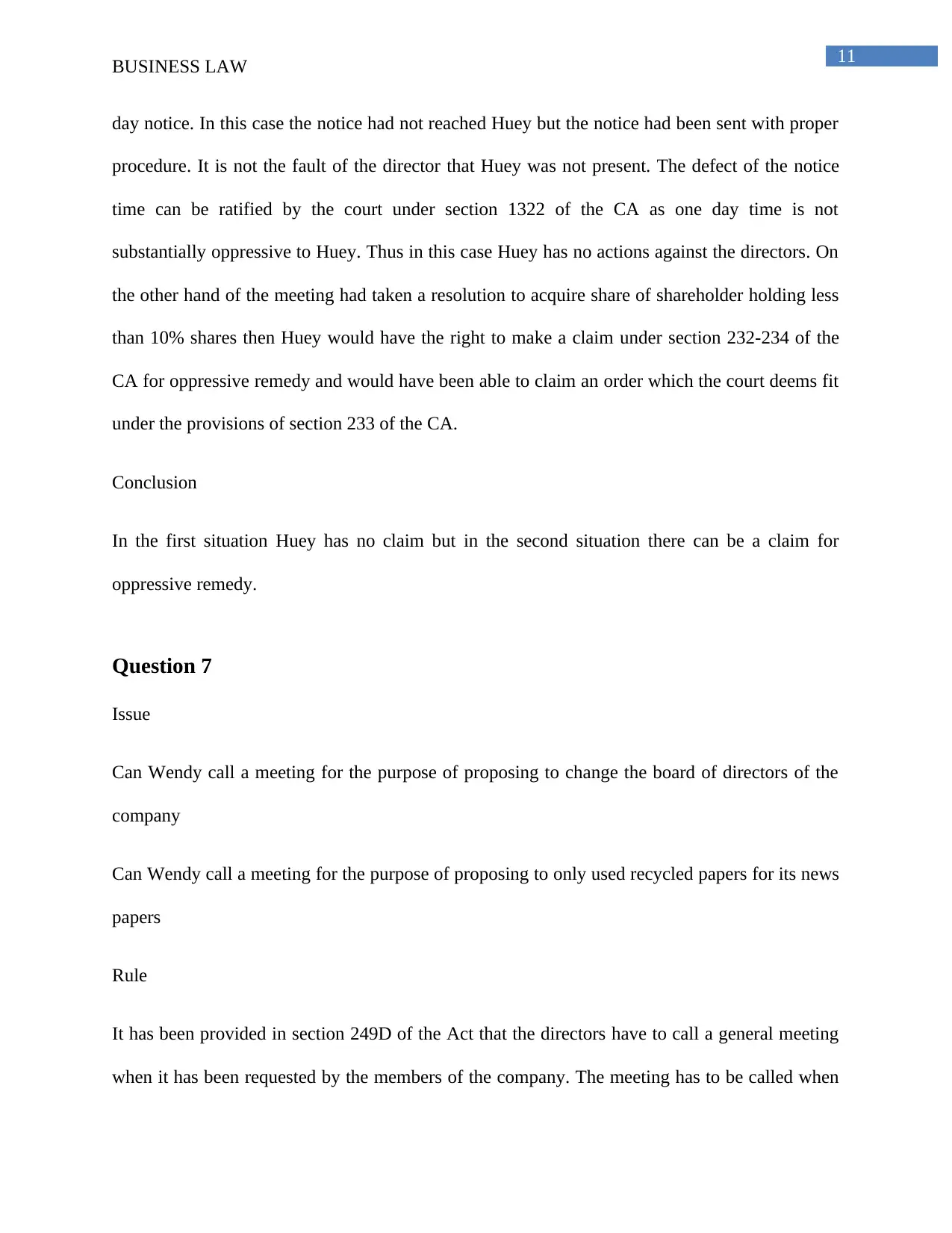
11
BUSINESS LAW
day notice. In this case the notice had not reached Huey but the notice had been sent with proper
procedure. It is not the fault of the director that Huey was not present. The defect of the notice
time can be ratified by the court under section 1322 of the CA as one day time is not
substantially oppressive to Huey. Thus in this case Huey has no actions against the directors. On
the other hand of the meeting had taken a resolution to acquire share of shareholder holding less
than 10% shares then Huey would have the right to make a claim under section 232-234 of the
CA for oppressive remedy and would have been able to claim an order which the court deems fit
under the provisions of section 233 of the CA.
Conclusion
In the first situation Huey has no claim but in the second situation there can be a claim for
oppressive remedy.
Question 7
Issue
Can Wendy call a meeting for the purpose of proposing to change the board of directors of the
company
Can Wendy call a meeting for the purpose of proposing to only used recycled papers for its news
papers
Rule
It has been provided in section 249D of the Act that the directors have to call a general meeting
when it has been requested by the members of the company. The meeting has to be called when
BUSINESS LAW
day notice. In this case the notice had not reached Huey but the notice had been sent with proper
procedure. It is not the fault of the director that Huey was not present. The defect of the notice
time can be ratified by the court under section 1322 of the CA as one day time is not
substantially oppressive to Huey. Thus in this case Huey has no actions against the directors. On
the other hand of the meeting had taken a resolution to acquire share of shareholder holding less
than 10% shares then Huey would have the right to make a claim under section 232-234 of the
CA for oppressive remedy and would have been able to claim an order which the court deems fit
under the provisions of section 233 of the CA.
Conclusion
In the first situation Huey has no claim but in the second situation there can be a claim for
oppressive remedy.
Question 7
Issue
Can Wendy call a meeting for the purpose of proposing to change the board of directors of the
company
Can Wendy call a meeting for the purpose of proposing to only used recycled papers for its news
papers
Rule
It has been provided in section 249D of the Act that the directors have to call a general meeting
when it has been requested by the members of the company. The meeting has to be called when
⊘ This is a preview!⊘
Do you want full access?
Subscribe today to unlock all pages.

Trusted by 1+ million students worldwide
1 out of 20
Related Documents
Your All-in-One AI-Powered Toolkit for Academic Success.
+13062052269
info@desklib.com
Available 24*7 on WhatsApp / Email
![[object Object]](/_next/static/media/star-bottom.7253800d.svg)
Unlock your academic potential
Copyright © 2020–2026 A2Z Services. All Rights Reserved. Developed and managed by ZUCOL.





